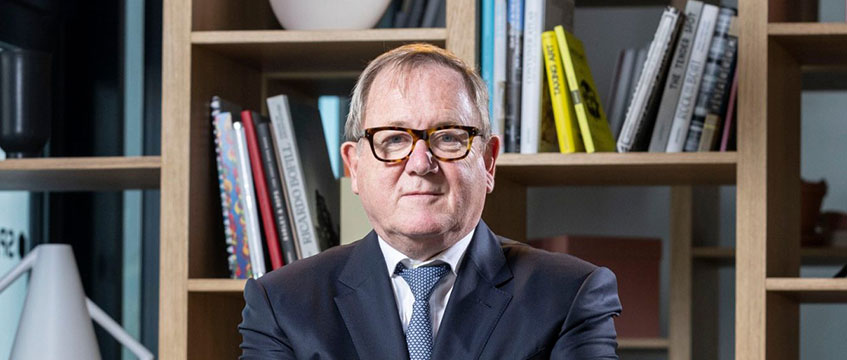THE LEHMAN CHRONICLES: In the latest in our series of recollections from the industry’s most influential players looking back at the collapse of Lehman Brothers, Johnny Sandelson – partner at Westbourne Capital Partners, co-founder of Auriens and founder of GuestInvest – talks about how the financial crash destroyed his business.
Looking back
Did you sense there was a crash coming?
I think we all knew we were living on borrowed time.
 I remember clearly the year earlier, I was on a seaside Cornish holiday with a friend. On the beach with intermittent service the Blackberry (remember those?) pinged, and it informed him of some bank bond failure: he turned to the group and said: “This is the beginning of the end.”
I remember clearly the year earlier, I was on a seaside Cornish holiday with a friend. On the beach with intermittent service the Blackberry (remember those?) pinged, and it informed him of some bank bond failure: he turned to the group and said: “This is the beginning of the end.”
I think every body returned to work that autumn with the feeling that the show was over, but we in our industry had to put a brave face on it. When you are in the middle of a development cycle there is no easy dropping-off point.
What are your abiding memories of the time around the collapse of Lehman itself?
My equity partner at the time was a major bank, HBOS. We had a combined facility of around £250m. People around me used to say how lucky we were to have a bank as a partner. Otherwise we would have had to rely on the old adage that “we were too big to fail”.
The truth is that in normal times, normal corrections, we would have been fine. But this was to be no normal storm.
The bank hadn’t been feeling the winds of change, they returned from the summer holidays of 2007 and said that, while other banks were retrenching, this was their opportunity to fill their debt boots, and take advantage over their competitors.
They increased their exposure during the next 12 months and they encouraged me as an equity partner to do the same. I was only too happy to ride the wave – my thinking was that the bigger we were, the safer we were.
This was to prove a terrible misjudgement.
The truth is that in normal times, normal corrections, we would have been fine. But this was to be no normal storm.”
It became quite clear that if Lehman could fail, then all banks could fail. Those weeks in the autumn of 2008 were like living through a box-set – although frightening it was also gripping. We were watching the share price of major companies tumble every day.
Housebuilders and companies with great underlying assets were being shorted to a fraction of their NAV. Everybody spoke of buying opportunities and only the very bravest and most liquid bought shares in those months.
It shortly turned out that we lost our debt partner and our equity partner on the same day. Neither my company, nor the bank, was too big to fail. The government put HBOS under the protective umbrella of Lloyds.
Not only was my business destroyed, Lloyds was then dragged under the bus. Two great British banks were sunk by this crisis, exuberance, ill judgment, and the Himalayan-style mountains of property debt.
Personally I felt enormous shame around this time. People who were employed by my company had to be made redundant. Active building sites had to be arrested, and since I had most of my equity invested in the now hollow “stack” I was very financially exposed.

I have a very specific memory of a meeting with the bank during this time and not recognising anybody. Entire departments had been removed and replaced. We were “invited” into a dark airless meeting room with plastic cups in Edinburgh, which was a very different world from their swanky offices in a converted Georgian townhouse with butler service in Mayfair.
Relationship managers who used to open meetings with friendly demeanours and pleasantries about upcoming rugby fixtures, and children’s holidays were now replaced by a collection of hardened bankers. They seemed pale and tired, hollow-eyed and frightened. They were at a loss to understand the intricacies of their portfolios.
I later learned that some had suffered terribly under the pressure of that time and they too were not victors of the crash.
This new cohort of banking partners looked on in disbelief at the seemingly ludicrous ambition of their ex-colleagues who, only a few weeks earlier, were encouraging growth.
How has it shaped things for you since?
It remains the most traumatic of memories, and the experience of having lived through those times has entirely shaped and, I imagine, will always inform my outlook on business.
It taught me nobody and no institution is too big to fail. It taught me to spread risk and to not be flattered into ventures, that liquidity can dry up and it needn’t happen gradually because everybody runs to the door at the same moment.
Looking forward
What do you think is the likelihood of another crash in the short to medium term (and why)?
It is always possible. Property corrections tend to happen usually every decade or so. But I don’t think we will see the same scale of devastation again for a while.
My rationale is that in my mind there hasn’t been the “irrational exuberance” that we witnessed in 2005, 2006 and 2007. The banks are more sensible, leverage is lower and the underlying US economy is strong.
We are not looking over our shoulders every day, but I’m never forgetful of those times.”
The valuers are more cautions and – crucially – the sponsors have got scars, which although may have healed, are good reminders that every time we feel we are “getting ahead of ourselves”. They provide a sleepless night and a chance to take a more modest view.
The memories of 2008 are still too fresh. I don’t think anybody enters a significant transaction anymore without a level of stress-testing.
We are not looking over our shoulders every day, but I’m never forgetful of those times. The best defence is a collective memory of the devastation of the past.
What things should investors look out for that might signal another crash?
My late father, a stockbroker, said a time to sell is when the chief executive of a property company justifies the need of a private plane!
Too much cheap liquidity and high gearing being available from banks are often tell-tale clouds on the horizon.
What sector or geography do you think looks most susceptible to a downturn?
[As a co-founder of Auriens] I’m hoping it’s not the care sector!
I’m focusing on domestic needs. Who knows what Britain looks like in 12 months, but what is fairly certain is that we have a top-10 global economy and its domestic audience needs to be serviced.
With my Auriens hat on, there is a significant need around the provision of homes for the elderly, and I’m focusing on this product for a specific London demographic as a defensive strategy.











